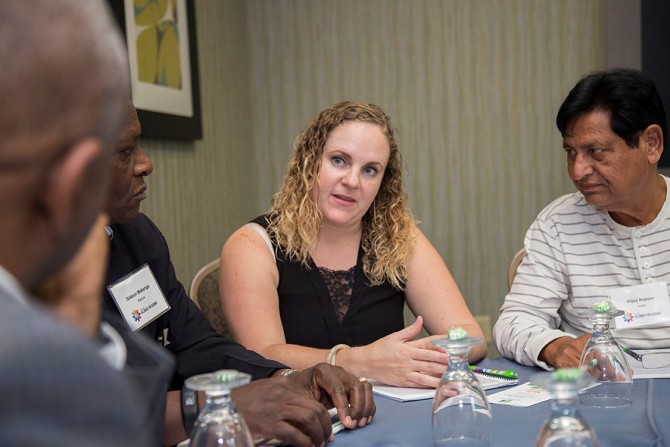Course offers global farming skills for success
By
Hailing from Zimbabwe to Uruguay and more than a dozen points in between, some 40 agricultural advocates gathered Sept. 18-23 in the first Cornell Alliance for Science training session developed solely for farmers.
The weeklong course, held in Rock Island, Illinois, was offered in response to requests from farmers seeking skills that can help them effectively express their needs and interests to a global public and policymakers. Training focused on communications and grassroots organizing.
Networking took place among the seasoned farmers who are already active internationally in agricultural education and outreach efforts. Although some cultivate thousands of acres and others a few hectares, and some raise animals while others grow crops, they have many common interests and concerns.
Chief among them, according to participants, is the desire for access to technology that can make farming more efficient, productive and profitable.
“Farming is first and foremost a business,” said Eve Tepsy Ntseoane, a maize and cattle producer in South Africa. “It must be profitable to be sustainable.”
Although just 2 percent of the U.S. population actively farms, that figure rises dramatically in developing nations. In sub-Saharan Africa, for example, 60 percent of the workforce is employed in agriculture, including many children, according to a report by the Food and Agriculture Organization.
As farmers struggle to succeed in an unpredictable economic, social and meteorological climate, increasingly they are joining forces to ensure that their perspectives are heard.
“Everybody likes to talk about what farmers need,” said Balwinder Kang, who grows genetically modified (GM) cotton and other non-GM crops in Rajasthan, India. “But nobody asks the farmers.”
Those participating in the training session described tendency by nonfarmers to romanticize agriculture, which typically translates into a call for farmers to abandon technology and return to imaginary bucolic times.
“Those weren’t the good old days,” said A.D. Alvarez, who is growing GM, pest-resistant Bt maize in the Philippines. “They consigned a lot of people to poverty.”
The training session equipped farmers with skills to engage with policymakers about their experience in agriculture. Like many farmers, the introduction of GM crops has reduced the use of pesticides sprayed on their fields. The technology also has been used to develop traits like drought tolerance and herbicide resistance, which eliminates hand weeding often imposed on women and children.
The farmers expressed their desire to select technology and practices used on their farms. They spoke of being able to send their children to school, refurbish their homes, expand their plantings and invest in equipment using profits realized from growing more productive GE crops.
“The intensive training in Illinois of farmers and business leaders is yet another layer of brickwork in the new wall for resilience against poverty, hunger and malnutrition, for which we applaud the Cornell Alliance for Science,” wrote Peter Wamboga-Mugirya, a small-scale farmer who grows chilies and cassava in Uganda. “The people-to-people ties that [the Alliance] is nurturing – moreso between community leaders in the developing south and those in the United States – is a direct contribution to the overall global attainment of socioeconomic development, peace and stability.”
Joan Conrow is managing editor for the Cornell Alliance for Science.
Media Contact
Get Cornell news delivered right to your inbox.
Subscribe